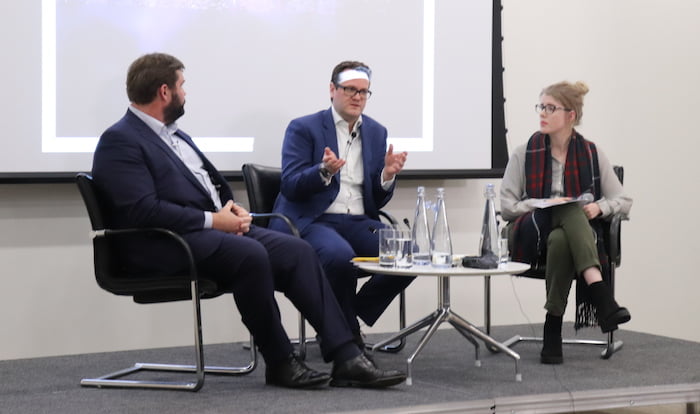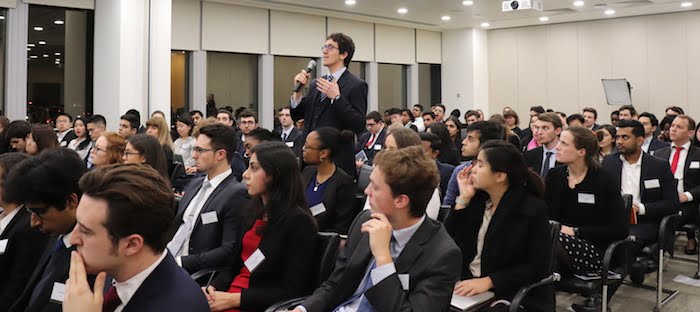Technology presents both risks and opportunities to traditional financial institutions — and their lawyers need to help them stay ahead of the curve

André Duminy was talking artificial intelligence (AI) over dinner a few months ago. His prediction, as head of Clifford Chance‘s UK Commercial & Technology Group, was that AI will make a real impact on the workplace in the next five to eight years. Not so, replied the man to his right, a project lead on the IBM Watson “supercomputer”. AI is coming in the next two or three years.
The breakneck pace of change was one of the running themes at Legal Cheek’s recent event on ‘Fintech — the future of financial institutions’, run with the help of Duminy’s firm. The Clifford Chance partner told an attentive audience in Canary Wharf that “there’s always been change, but it’s the pace of change today that’s absolutely astounding, and it’s all driven by technology”.
One extreme illustration of that: senior associate Peter Chapman mentioned in passing that the price of Bitcoin had hit the $10,000 mark. That was true when he was speaking, just a fortnight ago. It’s now hovering between $11,000-$14,000, having plunged from a high of nearly $20,000.
As they grapple with tech-based challenges to their business models, what financial institutions need is lawyers that can “stay ahead of the curve — not just with it but ahead of it — and to be able to spot risks and opportunities for our clients”.
Does that mean that there’s a growing market in fintech lawyers? Not as such, Chapman cautioned. In practice, financial technology transactions are not one-dimensional problems: they call for regulatory lawyers like Chapman himself, technology lawyers like Duminy, and even — if it all goes wrong — litigators to pick up the pieces.
Fintech: the future of financial institutions — with Clifford…
Some highlights from our fintech-themed commercial awareness event with Clifford Chance Graduates UK. Brilliant video from Stock + Bokeh #legalcheeklive
Posted by Legal Cheek on Thursday, December 7, 2017
It’s a point echoed by Duminy, who pointed out that when banks collaborate with fintech start-ups — the preferred industry model, ahead of in-house innovation and outright acquisition — all sorts of different legal issues arise. Intellectual property, mergers and acquisitions, contracts… “it becomes very tricky very quickly”. Technology, Duminy said, brings lawyers from across the firm, from different specialisations, into one team. If you ever wondered why City firms are as big as they are, this is one reason why: the sheer variety of expertise under one roof that can be brought to bear on a given legal problem.
Not all of what a firm like Clifford Chance offers is even legal advice, as Duminy recalled:
“Long gone are the days when we just practiced law. In fact there are times when I don’t think I actually practice law; I advise people on where the market is, what’s the best thing to do. You actually get involved in helping clients make decisions. Obviously you need your legal skills, and a good history of that to get to that point. But certainly in a place like this, you have that opportunity, to be more than just a lawyer. You become an excellent lawyer, but then you move into something different, and you move into giving commercial, business advice.”
‘Long gone are the days when we just practiced law'
The best lawyers are trained not just to provide legal advice but to give commercial guidance as well — and that's when the job gets really fun, says Clifford Chance Graduates UK Commercial & Technology partner André Duminy, speaking at a recent #LegalCheekLive
Posted by Legal Cheek on Thursday, December 21, 2017
Only, he said, firms that understand how regulation, technology and business come together are able to advise clients properly.
Both lawyers stressed that fintech isn’t just about “two guys in Old Street putting together an app”. Start-ups offering financial services is one part of what Chapman referred to as the “fintech story”. But “it’s actually much broader than that. It’s all-pervading. This fintech story affects all financial institutions and it affects all of the verticals within the financial services industry”.
As Duminy put it, fintech impacts on “existing institutional relationships”. It’s not just about helping banking clients cope with start-up muscling in on their territory. Banks — as institutions that have always run on technology — need to get involved in fintech themselves. Chapman pointed out that this basically boils down to keeping up, whether by providing existing financial products in a better way or coming up with new ones.

What kind of financial technology has come across your desk at Clifford Chance, then? (Here comes the educational bit.) Chapman identified four technologies driving change:
• Marketplace lending: crowdfunding or peer to peer lending, with the potential for “disintermediation” of the financial institution that used act as middleman for loans.
• Big data and AI: you might just have seen it in the newspapers. But it’s closer than you think: if you’ve applied for a credit card, according to Chapman, chances are that a machine took part of the decision on whether or not to approve you.
• Mobile payments: forget branches, even internet banking on a web browser is old hat. Some banks, indeed, exist only as apps (I instantly thought of my Revolut app, which started out offering as a slick currency exchange platform, but is now offering credit).
• Blockchain and distributed ledger: different things, but often used in combination. These are “the pieces of technology that underpin the Bitcoin phenomenon”. It’s not just media hype, either: Clifford Chance is “seeing a lot of work in this space”.
Even if you struggle to understand how this last bit of technology actually works, it’s easy to see how it could impact on a bank’s bottom line. As Chapman explains:
“The way Blockchain and distributed ledger works, can actually facilitate some of the financial services that [banks are] providing. One of the main effects of Blockchain/distributed ledger is that you don’t have to have some kind of central body to tell you, who owns a security or who owns how much money. Actually everybody on that network can potentially see who owns that security or who owns that money. So when you want to do those transactions, if I want to send some shares to André [Duminy], for example, we don’t have to instruct some central body to do that– we can do it on a peer to peer basis, we can do that directly. And everybody on the system will trust that if that transaction has happened and is recorded on the database, that that is a genuine transaction.”
The growth of blockchain in financial services
A very clear explainer of how blockchain works, and how global law firms are advising on its use, by Peter Chapman, a senior associate in Clifford Chance's Banking & Finance Group
Posted by Legal Cheek on Friday, December 29, 2017
So where does all this lead, and what does it means for lawyers? Plenty. Even a few cases studies throw up knotty legal problems. Financial advisors are regulated and require training: how does that work if your financial advisor is a robot powered by AI? Banks are starting to exploit the vast reserves of data they hold on their customers: does it actually belong to them? If you’re collaborating with a fintech start-up, who owns the IP?
As in other practice areas, the most valuable lawyers are the ones who can come up with legal solutions to novel legal problems.
Winding up, Duminy urged students to get excited: fintech presents a “fantastic opportunity for bankers and for us as lawyers”. You don’t have to be a STEM whizz to be add value as a lawyer either: while Duminy started his career as a programmer, Chapman confessed to a more orthodox career path as a law graduate. If he can master the issues, so can you.
About Legal Cheek Careers posts.
